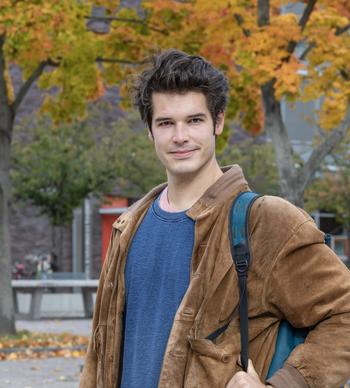Thom Sliwowski (University of California, Berkeley)
Doctoral Fellow in Research Area 3: "Future Perfect"
April–September 2021
Minor Senses of Historical Time in Late- and Post-Socialist Central Europe
Thom Sliwowski's project at EXC 2020 attempts to catalogue some peculiar senses of time in late- and post-socialist Germany and Poland, from around the 1970s to around the 1990s. Once hailed as the end of history, this period straddling the collapse of communism in fact turns out to be ripe with weird experiences of historical time: from the "retrograde modernity," the feeling of being stuck in a past and left behind the receding West, to the haunting remains of socialist material culture often amassed under the rubric of postsocialist nostalgia. Thom is interested in how writing becomes a technology for making felt these peculiar temporalities, which seem to "peel off" from the forward-moving time of progress or historical development. The texts and films he studies, read self-consciously in light of our own historical moment, come to appear as "seismographs" registering historical shifts, to borrow Aby Warburg's phrase, and the temporal genres they elaborate – the belated, the stagnating, the decaying, and the second-rate – can best be grasped as affective modes of relation to their historical present, which from our vantage point appears as a historicist period. How can late- and post-socialist shabbiness, cheapness, second-rate-ness be reframed as something more than a reflection of the Western gaze and an ideological judgment? Might framing this trope of outdatedness as an affective response furnish us with the means to describe a shared historical sense – one that reframes the cultural history of late- and post-socialism not as an artifact but as an affective present?
Thom Sliwowski is a PhD Candidate in the Department of Comparative Literature and in the Program in Critical Theory at the University of California, Berkeley. He is also affiliated with the Institute for Slavic, East-European, and Eurasian Studies. He works at the intersections of literary studies, historical anthropology, and critical theory, and is most broadly interested in the idea of historical consciousness in the 19th and 20th centuries. Affect theory, and the history of emotions, forms his other major research interest. During his time as a doctoral fellow at EXC 2020, he will be writing the second chapter of his dissertation, about the Polish writer Tadeusz Konwicki's fixation on unhinged time, unpredictable weather, and what he in his 1979 novel Mała Apokalipsa termed the "ruined-modern" atmosphere of late-socialist Warsaw.
